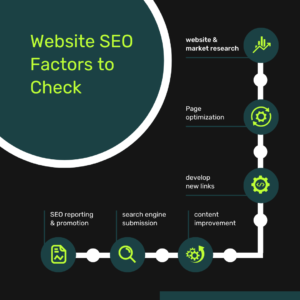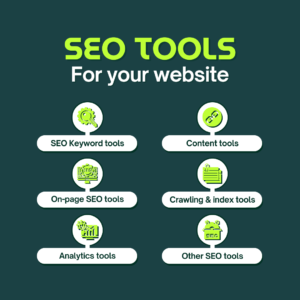How to Check Website SEO: A Comprehensive Guide for Website Owners
In today’s digital age, having a website is not enough. To stand out and attract the right audience, your website needs to be optimised for search engines.
Search Engine Optimisation (SEO) is a crucial aspect of digital marketing that ensures your website ranks higher in search engine results pages (SERPs), making it easier for users to find you.
But how do you know if your website is performing well from an SEO standpoint? Today we’ll explore various ways you can check your website’s SEO health, review the best tools for the job, and maybe even provide a few sneaky tips you won’t find anywhere else.
But first, let’s start with why this matters at all:
Why SEO Matters
Before we dive into how to check your website’s SEO, it’s important to understand why SEO matters in the first place. SEO is the process of improving your website’s visibility in search engines like Google, Bing, and Yahoo. The higher your website ranks on the search engine results pages (SERPs), the more likely people are to visit it. SEO involves multiple factors, including the quality of your content, website structure, backlinks, keywords, mobile-friendliness, and site speed.
If you neglect SEO, your website might struggle to show up in search results, leading to lower organic traffic and fewer opportunities for conversions. Regularly checking and improving your website’s SEO ensures you’re reaching the right audience and achieving your business goals.
What to Check for When Reviewing Your Website’s SEO

When evaluating your website’s SEO, several factors come into play. These are the elements search engines prioritise when ranking websites. Let’s break down the key SEO elements you should regularly review:
On-Page SEO
On-page SEO refers to the aspects of your website that you can control directly. This includes:
-
Title Tags and Meta Descriptions: Title tags are HTML elements that specify the title of a web page. A well-written title tag helps search engines understand the content of your page. Similarly, meta descriptions provide brief summaries of page content, helping users decide whether to click on your page in search results.
-
Headings and Subheadings: Headings (H1, H2, etc.) help break up content and make it more readable. They also allow search engines to understand the structure of your content.
-
Content Quality: Your content should be relevant, informative, and optimised for the keywords that users are likely searching for. Make sure your content addresses user intent and provides real value.
-
Internal Linking: Linking to other pages on your website helps users navigate your site and improves the flow of link equity throughout your site, boosting your SEO.
-
Keyword Usage: Effective keyword usage is essential for on-page optimisation. Keywords should be naturally integrated into the content, headers, and meta tags.
-
Image Optimisation: Use descriptive file names and alt text for images to ensure search engines can interpret them correctly. Optimised images can also improve page load speed.
Off-Page SEO
Off-page SEO involves activities done outside of your website to improve its ranking. The key factor here is backlinks, which are links from other websites that direct users to your site. High-quality backlinks signal to search engines that your website is trustworthy and authoritative. You should regularly assess your backlink profile using tools like Google Search Console or Ahrefs.
Technical SEO
Technical SEO refers to the behind-the-scenes factors that affect how search engines crawl and index your website. Some of the most important technical SEO elements to check include:
-
Mobile Friendliness: With the rise of mobile devices, Google uses mobile-first indexing, meaning the mobile version of your site is prioritised for ranking purposes. Use Google’s Mobile-Friendly Test to see how well your site performs on mobile devices.
-
Page Speed: A slow-loading website can lead to higher bounce rates and lower rankings. Use tools like Google PageSpeed Insights to assess how fast your website loads and get recommendations for improvement.
-
URL Structure: URLs should be short, descriptive, and contain relevant keywords. Avoid long, complex URLs with unnecessary characters.
-
Sitemap and Robots.txt: A sitemap helps search engines crawl and index your website effectively, while a robots.txt file instructs search engines on which pages they can or cannot crawl.
-
SSL Certificate: Websites with HTTPS encryption are considered more secure and are given priority by search engines. Ensure your website has an SSL certificate to improve both security and SEO.
-
Structured Data Markup: Adding structured data (also known as schema markup) helps search engines better understand the content on your website, which can improve your visibility in rich snippets and featured results.
User Experience (UX)
User experience (UX) is increasingly becoming a ranking factor in SEO. Google wants to prioritise websites that offer a positive user experience, which includes:
-
Navigation and Structure: A well-organised website with clear navigation helps users find what they’re looking for quickly.
-
Bounce Rate and Time on Site: High bounce rates or low time on site might indicate that users aren’t finding your content useful. This can negatively impact your SEO.
-
Engagement: Encourage users to engage with your content by using call-to-actions (CTAs), multimedia, and compelling content that holds their attention.
The Best SEO Tools to Check Your Website’s SEO

Checking your website’s SEO manually can be time-consuming and complex. Thankfully, there are a number of tools available that can help you streamline the process. Here are some of the best SEO tools for analysing your website:
Google Search Console
Google Search Console is a must-have tool for website owners. It provides invaluable data on how your website is performing in Google search, including impressions, clicks, and average position. It also helps you track indexing issues, crawl errors, and backlink performance. By regularly reviewing your Google Search Console account, you can stay on top of technical SEO problems and address them promptly.
Google Analytics
Google Analytics is another essential tool for measuring website performance. While it doesn’t provide direct SEO insights, it gives you an overview of user behaviour, including traffic sources, bounce rates, and conversion rates. This information is crucial for evaluating how your SEO efforts are impacting user engagement and conversions.
SEMrush
SEMrush is a comprehensive SEO tool that provides insights into your website’s SEO performance, keyword rankings, backlink profile, and more. It also offers competitive analysis, allowing you to track how your website compares to competitors in your niche. SEMrush’s Site Audit tool is particularly useful for identifying on-page and technical SEO issues.
Ahrefs
Ahrefs is widely regarded as one of the most powerful SEO tools on the market. It offers an in-depth backlink analysis, keyword research, content analysis, and competitor research. The Site Audit feature can help identify technical issues, while the Rank Tracker allows you to monitor your keyword rankings over time.
Yoast SEO (For WordPress Sites)
If you’re using WordPress, the Yoast SEO plugin is a must-have. It helps optimise your on-page SEO by providing real-time analysis of your content, meta descriptions, and keyword usage. Yoast also generates an XML sitemap and integrates with Google Search Console for easier site management.
Moz Pro
Moz Pro is another great tool for tracking your website’s SEO performance. It offers a range of features, including keyword tracking, site audits, and backlink analysis. The MozBar, a browser extension, allows you to quickly view important SEO metrics on any webpage.
Screaming Frog
Screaming Frog is a website crawler that can help you identify technical SEO issues on your website, such as broken links, missing meta descriptions, duplicate content, and more. It’s particularly useful for large websites with hundreds or thousands of pages.
How OmniSEO Can Help Your Website Rank Higher
While checking your website’s SEO is an essential step in improving its performance, SEO can be a complex and time-consuming process. That’s where omniSEO, one of the leading SEO agencies in Cardiff, can help. With years of experience helping businesses achieve significant SEO results, omniSEO has built a reputation for delivering tailored SEO strategies that drive real, measurable results.
Whether you’re a local business in Cardiff or a national or global brand, omniSEO’s team of experts can analyse your website’s SEO health, identify areas for improvement, and implement strategies that will boost your rankings, drive more traffic, and increase conversions.
OmniSEO Offers a Free SEO Game Plan
If you’re unsure where to start or how to improve your website’s SEO, omniSEO offers a free SEO game plan to help you get started. This plan includes a one-on-one phone call with an SEO professional who will review your website, provide valuable feedback, and offer actionable tips to help you quickly boost your website’s rankings and traffic. If you’re looking to improve your website’s SEO but aren’t sure where to start and are looking to avoid investing more than necessary, this is the best way to start. Whether you’re looking for quick wins or long-term strategies, omniSEO’s team is here to help.
Checking your website’s SEO is a crucial step in improving its visibility, driving more traffic, and ultimately achieving your business goals. By regularly assessing on-page, off-page, and technical SEO factors, and using the right tools, you can ensure that your website is performing at its best.
However, SEO can be complex, and for many businesses, it’s a task best left to the experts. OmniSEO, one of Cardiff’s top SEO agencies, has a proven track record of delivering exceptional results for both local and national clients. With a free SEO game plan, you can get professional advice on how to quickly improve your website’s SEO performance.
So, why wait? Start checking your website’s SEO today and take the first step toward achieving better rankings and more traffic!

